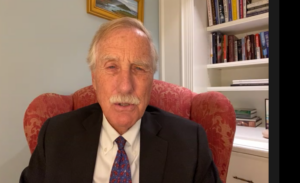
The successful disruption by the U.S. military of Russian cyber activities prior to the 2018 mid-term congressional elections may be proving to be a deterrent against Russian President Vladimir Putin attempting sustained cyber-attacks against Wester targets amid Russia’s war against Ukraine, one of the U.S. Senate’s leading cyber experts said on Wednesday. Sen. Angus King (I/D-Me.), who was co-chair of the Cyberspace Solarium Commission (CSC), said he can’t “prove” the rationale of Putin’s reluctance for cyber activities against the West…

 By
By 











